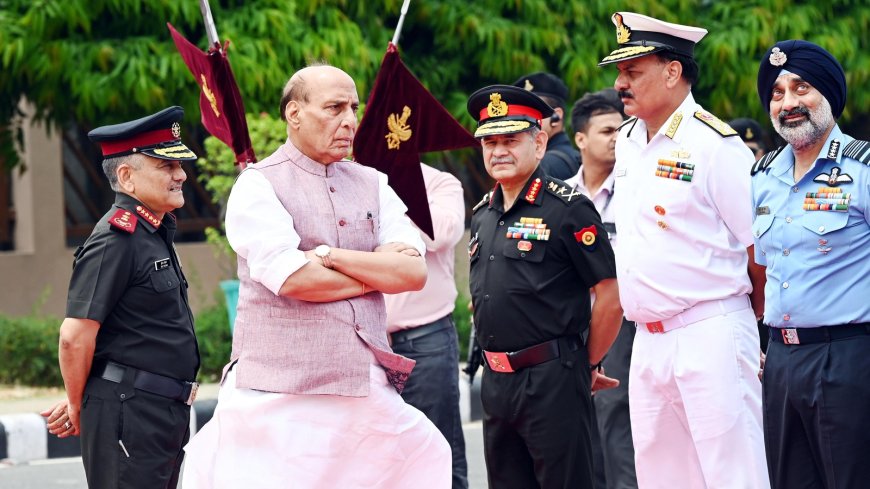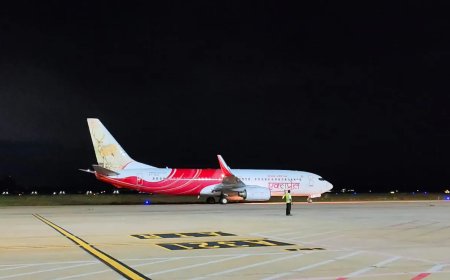Indian Government Grants Army Chief Authority to Mobilize Territorial Army for Support in India-Pakistan Conflict
The Indian Government has empowered the Army Chief to activate the Territorial Army in times of need, especially in the ongoing India-Pakistan conflict. This article explores the significance and implications of this decision.

Indian Government Grants Army Chief Authority to Mobilize Territorial Army for Support in India-Pakistan Conflict
The ongoing tensions between India and Pakistan have once again brought national security to the forefront of political discussions. Recently, the Indian government granted the Army Chief the authority to mobilize the Territorial Army (TA) to support the regular army in the event of a conflict or national emergency. This critical decision marks a significant shift in India’s military preparedness and highlights the government's commitment to ensuring a robust defense system in the face of external threats.
Here’s a breakdown of this decision and what it means for India's defense strategy:
1. What is the Territorial Army?
The Territorial Army (TA) is a unique reserve force within the Indian Army. It serves as a support unit to the regular army during times of national emergencies, war, or internal disturbances. Unlike the regular army, the Territorial Army primarily consists of civilians who have undergone basic military training and are enlisted to serve for specific periods. These individuals maintain their civilian jobs while being on standby to be called up for military duties when necessary.
The Territorial Army serves various roles, from providing logistical support and training to acting as a reserve force in combat situations. Its main function is to supplement the army during times of crisis and ensure that the nation’s defense forces are adequately prepared to face external threats.
2. Empowering the Army Chief
By granting the Army Chief the power to mobilize the Territorial Army, the Indian government has provided a much-needed strategic advantage. This move allows for a swift and organized response to any escalating situation, particularly the tense India-Pakistan conflict. The decision ensures that the army has the flexibility to call upon reserve forces quickly and efficiently, increasing its manpower and readiness during times of heightened security concerns.
This power to mobilize is especially crucial in situations where a rapid deployment of forces is required. It reduces the time needed to prepare for defense operations, allowing the Indian Army to respond effectively to any aggressive actions taken by Pakistan.
3. Strengthening National Security
The primary goal of this move is to reinforce India's security framework. With the rising tensions between India and Pakistan, particularly concerning cross-border terrorism and military skirmishes, ensuring that the country is prepared for any potential escalation is crucial. The mobilization of the Territorial Army provides the necessary resources and manpower to support regular troops during a conflict, thereby enhancing the overall defense capabilities.
Moreover, the mobilization ensures that India is not caught off guard in case of unexpected developments in the region. It offers a strategic advantage in dealing with an adversary that may engage in sudden military actions. The readiness of both the regular army and the Territorial Army creates a formidable defense force that can act swiftly to safeguard national borders.
4. Mobilization during India-Pakistan Tensions
The India-Pakistan relationship has been marked by decades of tension, primarily due to disputes over the Kashmir region. Both countries have fought multiple wars and have frequently engaged in skirmishes along the Line of Control (LoC). The decision to empower the Army Chief to mobilize the Territorial Army comes as a response to the volatile security environment created by the ongoing dispute.
This move reflects the government's awareness of the potential for escalation in the region. By mobilizing the Territorial Army, India ensures that it has a quick and robust response mechanism to deal with any situation that may arise from its neighbor's actions. The mobilization is not just a defensive measure but also a deterrent to any further provocation.
5. The Importance of Readiness and Rapid Deployment
In military operations, the ability to rapidly deploy forces and resources is crucial. The Territorial Army’s role in this context is to ensure that additional personnel and support units are available to the Indian Army at a moment’s notice. This speed and preparedness are vital in any military engagement, especially when tensions are high.
The Indian Army, with the assistance of the Territorial Army, can ensure that it remains combat-ready in the face of potential threats. With the increasing frequency of ceasefire violations and terrorist activities along the border, having the ability to quickly call on reserve forces will allow India to maintain an upper hand in terms of both defense and offensive capabilities.
6. Strategic Implications for India
Granting the Army Chief the power to mobilize the Territorial Army not only boosts the country’s defense capabilities but also sends a strong message to adversaries. It signals India’s commitment to securing its borders and maintaining peace and stability in the region. The move demonstrates that India is prepared to take all necessary steps to protect its sovereignty, whether through diplomatic means or military preparedness.
Additionally, the decision strengthens the deterrence effect against potential aggressors. When adversaries know that India has the ability to swiftly mobilize its forces, it becomes less likely for them to take aggressive actions. This enhanced deterrence is an essential part of maintaining peace along the borders.
7. Enhancing Civil-Military Cooperation
The integration of the Territorial Army with the regular army also serves as an opportunity to strengthen the relationship between the civilian population and the military. Members of the Territorial Army often come from diverse backgrounds, and their active participation in national defense fosters a sense of unity and shared responsibility for the country’s security.
This collaboration between civilian and military forces also provides valuable training and experience for the members of the Territorial Army. They gain first-hand exposure to military operations, which enhances their preparedness for future mobilizations. At the same time, the regular army benefits from the unique skills and civilian expertise that the Territorial Army personnel bring to the table.
8. Conclusion
The Indian government's decision to empower the Army Chief to mobilize the Territorial Army during the India-Pakistan conflict is a vital step in strengthening the country’s defense preparedness. This move ensures that India has a well-coordinated and effective response mechanism to deal with any escalation in tensions or military engagements. By bolstering its defense capabilities, India sends a clear message about its readiness to safeguard its borders and maintain peace and stability in the region.
As the geopolitical landscape continues to evolve, having a robust and prepared defense force, backed by the mobilization of the Territorial Army, will play a crucial role in India’s national security strategy. With tensions running high, this decisive move provides reassurance that India is ready to defend its sovereignty against any challenges that may arise.
What's Your Reaction?





















































